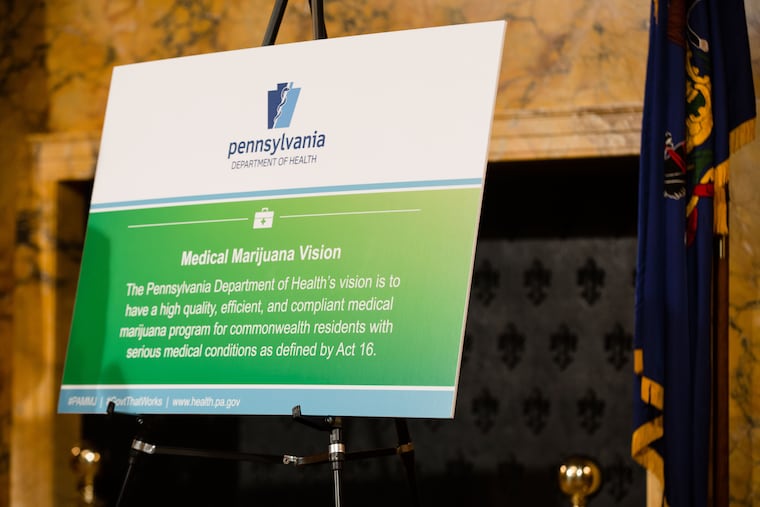Why Pennsylvania’s Health Department is taking Spotlight PA to court
How many people in Pennsylvania use medical marijuana for opioid addiction? The Wolf administration is taking Spotlight PA to court for trying to find out.

Spotlight PA is an independent, nonpartisan newsroom powered by The Philadelphia Inquirer in partnership with PennLive/The Patriot-News, TribLIVE/Pittsburgh Tribune-Review, and WITF Public Media. Sign up for our free newsletters.
HARRISBURG — A panel of Commonwealth Court judges is set to hear arguments this month over whether the Wolf administration must reveal details of how patients and physicians are using the state’s medical cannabis program for addiction treatment.
Nearly a year ago, Spotlight PA sought information on how often physicians approve patients for the program to treat opioid use disorder. An independent agency that settles public records disputes involving the Wolf administration ordered the Department of Health to release the records last September, but the health agency refused and appealed to Commonwealth Court.
Here’s what you need to know about the case, why it matters, and what comes next:
What Spotlight PA requested: In Pennsylvania, only patients suffering from specific medical conditions can qualify for the state’s medical cannabis program. The list of 23 qualifying conditions includes anxiety disorders, severe chronic or intractable pain, epilepsy, and opioid use disorder.
Since Pennsylvania lawmakers legalized medical cannabis in 2016, physicians have certified hundreds of thousands of patients for the program.
Spotlight PA requested information about how many of those patients were approved for each of the qualifying conditions. The newsroom specifically asked for aggregate data — meaning the information would not identify individual patients.
Why Spotlight PA is fighting for the records: The newsroom wanted to better understand the impact of the Wolf administration’s unusual and controversial decision to endorse cannabis as a treatment option for opioid use disorder.
The state’s decision had unintended and far-reaching consequences, Spotlight PA investigations found. Confusion over conflicting federal and state cannabis policies created widespread uncertainty for workers on the front line of Pennsylvania’s opioid epidemic, wrongly preventing at least one person who later died of an overdose from accessing addiction treatment.
And some cannabis businesses operating in Pennsylvania have used inaccurate or misleading claims to promote marijuana as a treatment for opioid addiction, potentially putting patients’ lives at greater risk, several health-policy experts told Spotlight PA after the newsroom conducted a first-of-its-kind review of more than 60 websites.
What is the Wolf administration’s argument for not providing the records? The medical marijuana law has confidentiality rules and clear limits on what information can be released, attorneys for the Department of Health argued in a legal brief. Summarized information about patient certifications isn’t one of the specific items identified as a public record in the state’s medical marijuana law, and attorneys said releasing that information could lead to “criminal liability” for Health Department employees.
What is Spotlight PA’s argument? Paula Knudsen Burke, an attorney with the Reporters Committee for Freedom of the Press who is representing Spotlight PA for free in the case, said the medical marijuana law exempts individual patient records — not aggregate data. She said the department’s argument relies on a mischaracterization of the law.
“The records sought in this case are exactly the kind for which the [Right-to-Know Law] was enacted,” she wrote in a January brief. Releasing the information “will enable the public to better understand the implementation of a new government policy in which the public has tremendous interest.”
What’s the “criminal liability” risk of releasing the information? Department of Health attorneys have pointed to a section of the state’s medical marijuana law that says agency employees can be charged with a third-degree misdemeanor if they disclose “any information related to the use of medical marijuana.”
But that requirement includes exceptions, Burke noted in her brief. The law says that that penalty does “not apply where disclosure is permitted or required by law or by court order.”
The Wolf administration has released similar aggregate data in other instances, including the total number of patients certified in the program, the number of patients approved because of an anxiety diagnosis, and the number of patients in specific counties.
Are any other records part of this case? Yes. Spotlight PA also requested any written policies or procedures describing how the Department of Health tracks the use of its medical marijuana program, including which qualifying conditions are certified. The state’s Office of Open Records ordered the department to turn over those records, saying the department failed to meet its burden of proving they do not exist. The Department of Health appealed that decision to Commonwealth Court as well.
What comes next: A hearing before a panel of judges is scheduled for 1 p.m. on Tuesday, May 17, in Pittsburgh. It will be livestreamed by Commonwealth Court.
After the court issues its decision, which could take several months, either side could petition the Supreme Court of Pennsylvania, asking for permission to appeal.
WHILE YOU’RE HERE ... If you learned something from this story, pay it forward and become a member of Spotlight PA so someone else can in the future at spotlightpa.org/donate. Spotlight PA is funded by foundations and readers like you who are committed to accountability journalism that gets results.